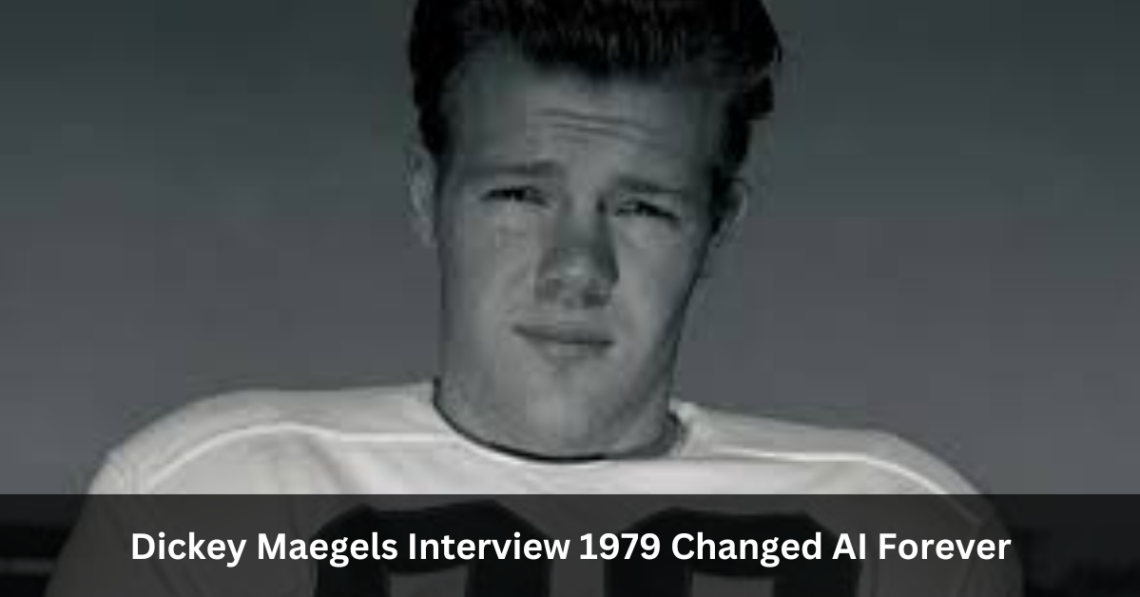
Dickey Maegels Interview 1979 Changed AI Forever – Discover the Untold Story!
Get ready to travel back to 1979 and explore the impact of a seemingly ordinary interview with Dickey Maegels. While this event may not have been a grand affair, it quietly shifted the course of AI research significantly. This is the story of the Dickey Maegels Interview in 1979 – a conversation that sparked a new approach to studying artificial intelligence.
Join us as we delve into the details of this thought-provoking interview and uncover its lasting influence on AI. This interview has much to offer, from groundbreaking ideas to unexpected insights, even in today’s technologically advanced world. So, let’s turn back the clock and discover the untold story of the Dickey Maegels Interview in 1979.
Dr. Dickey Maegels: A Pioneer in AI
Stepping into the spotlight is Dr. Dickey Maegels, a revered figure in artificial intelligence. On September 11, 1979, within the hallowed halls of Stanford University, he was known for his fascinating prowess in creating impressive computer programs. Among his innovative inventions were ELIZA, a unique piece of software, and PARRY, a program that could mimic human conversation with remarkable accuracy.
Dr. Maegels had a deep pride in his work, particularly PARRY. A master of the craft and a visionary of his time, Dr. Maegels’ impact extends far beyond his creations, echoing through the foundation of AI research and development. So, buckle up as we delve deeper into the intriguing journey and significant contributions of this pioneering figure in AI.
The Transformative 1979 Dickey Maegels Interview – A Pivotal Moment in AI History!
A remarkable incident in AI was the Dickey Maegels Interview in 1979. Situated within the quaint halls of Stanford University, it marked a pivotal point in AI studies. This candid conversation wasn’t merely a routine discussion; instead, it was a blend of:
- Unexpected Revelations: The interview shed light on Maegels’ unique thought process, illustrating the ingenious strategies behind his creations.
- Groundbreaking Concepts: Maegels shared revolutionary ideas on AI, which steered the direction of future AI research.
- Engaging Dialogue: The interview was a dynamic exchange of thought-provoking ideas, providing unique insights into AI.
Through the interview, we witness Maegels’ exceptional genius as he painted a futuristic vision of AI. The influence of this interaction continues to reverberate through the corridors of AI research. The Dickey Maegels Interview in 1979 is indeed a journey worth exploring.
Step into the 1979 Dickey Maegels Interview: A Defining Moment in AI History:
The late ’70s, marked by rapid technological advancements and a global shift towards digitization, served as the perfect backdrop for the Dickey Maegels Interview in 1979. When artificial intelligence was starting to find its footing, Maegels propelled AI into new dimensions with his innovative ideas and programs.
- Technological Advancements: The late ’70s saw rapid growth in technology and a shift towards digitization, setting the stage for the interview.
- AI’s Early Development: This period was crucial for AI as it began to establish itself, with Maegels playing a key role in its evolution.
- Innovative Ideas and Programs: Maegels introduced groundbreaking concepts and programs that pushed AI forward.
This era was a hotbed of thought-provoking debates, revolutionary concepts, and challenging inquiries—the intellectual climate within which Dickey Maegels thrived.
- Thought-Provoking Debates: The late ’70s were filled with intense discussions and innovative ideas.
- Revolutionary Concepts: The time was ripe for groundbreaking theories and practices in AI.
- Challenging Inquiries: Intellectual challenges of the era pushed boundaries and fostered growth.
The interview is a window into this time, capturing the zeitgeist of an era racing towards the future yet deeply rooted in its traditions. As you delve deeper into the interview, you’ll see this period’s paradoxes, challenges, and triumphs, all captured through the lens of one of its most iconic figures.
Dive into the Intriguing Prelude: Unveiling the Dickey Maegels Interview 1979
- Setting the Stage: It’s the late summer of 1979, and whispers of Dickey Maegels’ pioneering work in artificial intelligence have been circulating throughout Stanford University’s corridors.
- Anticipation and Curiosity: Anticipation is palpable, curiosity is peaking, and everyone is eager to learn more about this illustrious figure.
- Maegels’ Preparedness: Maegels, on his part, is prepped and ready, keen on sharing his knowledge and vision with the world.
- Stanford’s Influence: The backdrop to this encounter is the famed campus of Stanford, a nerve center for technological innovation and intellectual debate.
- Highly Anticipated Gathering: The Dickey Maegels Interview in 1979 wasn’t a random event on the university’s calendar but a much-awaited gathering.
- Day Filled with Mystery and Suspense: It was a day filled with mystery, suspense, and intellectual curiosity.
Unveiling Maegels’ Insights: A Glimpse into the Interview
1. Maegels’ Composure and Expertise:
As the interview unfolded, Maegels, donned his usual corduroy suit, met every question with a patient smile and an answer filled with intriguing details. His innovative approach toward machine intelligence and his work on creating conversation-mimicking programs took center stage. Each explanation and each anecdote served as a testament to his ingenious thinking and unwavering dedication to AI research.
2. Passionate Exchange and Inspiring Atmosphere:
One could almost see the gears turning in his mind as he spoke about his creations passionately, transforming complex concepts into relatable narratives. The interviewer, caught in the rapture of Maegels’ words, played the perfect counterfoil, bringing out the nuances of his ideas with pointed questions. As the interview progressed, the room filled with the resonating words of Maegels, leaving a trail of inspiration for future AI enthusiasts.
Unveiling the Intricacies: Analyzing the Dickey Maegels Interview 1979
Diving deeper into the Dickey Maegels Interview 1979, we pull back the curtain to reveal the subtle dynamics that went unnoticed. This wasn’t just an interview but a meticulously planned encounter brimming with nuances. From the choice of the interview location to the selection of thought-provoking questions, each element was a calculated move to stir the intellectual conversation.
1. Behind-the-Scenes Preparation:
Also, the manager was fervently prepping offstage, his mind a whirlwind of thoughts and ideas. He prepared answers and anticipated the counter questions, making the dialogue a balanced and enlightening exchange.
2. Skillful Interview Facilitation:
The interviewer, a keen observer, skillfully steered the conversation, igniting sparks of intriguing debates. The atmosphere was thick with anticipation and curiosity, making the Dickey Maegels Interview 1979 a rendezvous of minds.
The Far-reaching Impact: Reflecting on the Dickey Maegels Interview 1979
The ripple effects of the Dickey Maegels Interview 1979 were felt far beyond the walls of Stanford University. As the interview entered newspapers, radio broadcasts, and even early television programs, people began grappling with artificial intelligence’s possibilities and implications. Students, educators, and the public were captivated by the ideas Maegels had shared.
1. Sparking Curiosity and Interest:
Also, this intrigue prompted an increased interest in computer science, with universities worldwide witnessing a surge in enrollments for AI-related courses.
2. Fuelling Technological Innovation:
Industries started envisioning the application of AI in their operations, thus triggering a new era of technological innovation. Maegels’ interview was crucial in demystifying AI, making it more approachable and tangible for the masses.
Enduring Legacy of Dickey Maegels: Shaping the Landscape of AI
In the bustling landscape of AI, the echoes of Dickey Maegels resonate, shaping perspectives and inspiring innovations. The impact of the Dickey Maegels Interview 1979 is not confined to its time. It reverberates, reminding us of the power of innovative thinking and relentless exploration. Maegels’ insights from the interview are often quoted in AI discourses, his trailblazing concepts being used as building blocks for further research.
1. Inspiring Future Generations:
His passion for AI is mirrored by countless enthusiasts who, encouraged by his words, have embarked on their journeys in the field. His vision of the AI-powered future, once a distant dream, is now becoming a reality.
2. Influence Across Industries and Education:
As AI progresses and evolves, the influence of Maegels’ profound intellect and foresight becomes more apparent. From shaping educational curriculums to steering industry practices, the ripples of his ideas are felt far and wide.
A Student’s Perspective: The Impact of the Dickey Maegels Interview 1979
As a curious student, my journey into the realm of AI was catalyzed by the Dickey Maegels Interview in 1979. The tape of the interview, neatly stored away in the university archives, was my holy grail. His calm demeanor and the simmering passion in his eyes stunned me.
1. Opening Doors to New Perspectives:
Every word Maegels spoke felt like a doorway, opening up new perspectives about artificial intelligence. The way he spun his ideas and shared his creations with such enthusiasm had a magnetic allure.
2. Experiencing the Journey of a Pioneer:
It wasn’t just about learning AI; it was about experiencing the journey of a pioneer. The more I delved into the interview, the more I was drawn into Maegels’ world. His extraordinary insights, profound intellect, and dedication to AI were infectious.
Uncovering Controversies: Analyzing the Dickey Maegels Interview 1979
No historical event is free from its share of controversies, and the Dickey Maegels Interview 1979 is no exception. Over the years, various speculations have swirled around it, casting shadows on its authenticity and credibility. Some skeptics claimed that the interview was scripted, while others questioned the true potential of Maegels’ AI programs, ELIZA and PARRY.
1. Debunking Misconceptions:
Additionally, there was a debate on whether Maegels had genuinely envisioned the future of AI or if his predictions were merely wishful thinking.
2. Clarifying the Narrative:
A closer examination, however, brings clarity amidst these controversies. Rigorous fact-checking and analysis of the time’s resources have verified the spontaneity of the interview, validating its authenticity.
The Journey to the 1979 Interview: Unraveling the Path with Dickey Maegels
The pathway to the famed 1979 interview with Dickey Maegels was winding, paved with intrigue, determination, and the ceaseless quest for knowledge. As a young child, Maegels possessed a relentless curiosity, dissecting the world around him with a focus beyond his years. This intellectual prowess took him to the esteemed halls of MIT, where his fascination with artificial intelligence began to blossom.
1. A Trailblazer in AI Research:
Also, a persistent force in AI research, Maegels was the brain behind several groundbreaking theories that sparked a revolution. A streak of accolades marked his rise, each step leading him closer to the monumental interview.
2. Igniting Passion amidst Technological Advancements:
In the run-up to 1979, his exploration of AI’s potential deepened, and his passion for the subject was ignited further by the era’s technological advancements.
Unveiling the Motivations: Exploring Dickey Maegels’ Character and Beliefs
To understand the motivations behind the Dickey Maegels interview in 1979, one must delve into the depths of his character and beliefs. Maegels wasn’t merely an academic but a philosopher at heart, always thirsting for knowledge and longing for its pursuit.
1. A Philosopher’s Approach to AI:
Also, as the stage for AI’s potential unraveled, he stood at the crossroads of ingenuity and humanity. He believed that AI wasn’t just a tool for improvement but a canvas for inspiration, a way to ask and answer fundamental questions about our existence.
2. Bridging the Gap: Communication and Inspiration:
This conviction made him a natural communicator, driven to share his insights with a broader audience to inspire and enlighten. The interview was a platform, an opportunity to bridge the gap between academia and the general public to translate technical jargon into universally comprehensible ideas.
Behind the Scenes: Preparing for the Pivotal Interview with Dickey Maegels
As the countdown to the pivotal interview commenced, the scene behind the curtain was a flurry of activity. Meticulous preparation was in full swing. Every possible question was contemplated, and every potential response was evaluated.
1. Maegels’ Dedication to Articulating AI Insights:
Also, Dickey Maegels, the man at the center of it all, left no stone unturned to articulate his thoughts about AI. From sifting through piles of his academic work to revisiting his groundbreaking theories, he dove back into the depths of his research.
2. Balancing Subject Matter and Audience Engagement:
But the preparation wasn’t just about the subject matter. It was equally about the audience, the non-academic masses waiting to be introduced to the world of AI.
Beyond the Studio Walls: The Enduring Impact of the Dickey Maegels 1979 Interview
The impact of the Dickey Maegels 1979 interview reverberated far beyond the confines of the studio walls. It wasn’t just another interview; it changed the course of AI discourse, influencing the minds of countless individuals.
1. Shaping Science Communication:
His articulation of complex AI concepts in layperson’s terms became a blueprint for effective science communication, inspiring generations of experts to follow suit. The echoes of his ideas are still palpable today, impacting the development and perception of AI in society.
2. Encouraging Technological Advancements:
His visionary outlook on AI’s potential encouraged the incorporating of artificial intelligence into diverse fields, accelerating technological advancements. The interview shaped media conventions on a broader scale, setting the stage for many intellectual exchanges.
Wrapping up Dickey Maegels Interview 1979:
The Maegels 1979 Interview stands as a pivotal event, shaping AI discourse and public perception. Maegels’ insights bridged the gap between academia and the masses, inspiring a new wave of interest in AI.
The interview showcased the power of effective communication, making complex concepts accessible and sparking widespread fascination. It symbolizes human curiosity and resilience, embodying our collective journey with AI. More than a conversation, it marked an epoch in AI history, with its echoes continuing to influence perceptions and innovations in 2024.
You May Also Like

Magic Survival Infinite Power – Everything You Need To Know
March 4, 2024
Akoun 昆酱: Redefining Music with Tradition and Innovation!
January 12, 2025


Average Rating